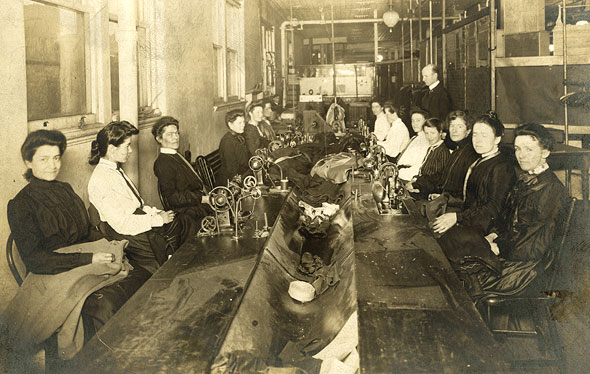
more jobs: war, destruction, protectionism etc.
It's always difficult to predict new economic developments, but new changes in the economic system generally do follow a kind of pattern. Whenever a new technology is produced that can save effort or cost in production, it is implemented to allow a firm to produce its goods more cheaply. If this is realized in lower prices on the market, it's a direct gain for consumers, and if some of the returns are reinvested in the firm, more often than not more future developments can be realized. Of course any kind of change in the methods of production imply a change in economic necessities and a bit of uncertainty; equipment or workers often need to be hired or fired, but the end result is always a more efficient economic outcome.
Of course the political problem begins when we start speaking about the human element. It's easy for an analyst to see that old obsolete jobs are only an unnecessary cost on business and it's not difficult for an economist to see that the money saved by the consumer by purchasing a more efficiently produced product will result in freed up financial capital. But this thinking is totally lost on common people; the structural loss of a job, be it to machinery, Mexicans or Chinese is taught as some kind of causeless mortal sin and obviously no demagogic politician has the gusto to challenge this assumption.

I would vote for a politician who promised to destroy jobs because that would indirectly imply that his policies would be those of technological and economic development which would overthrow old production. Naturally I do acknowledge what many don't, that even if a politician exerted a dictatorial control over the legislature, he would still have little power to actually instigate job policy. Nonetheless I suppose it's easier for people to pretend that their elected officials or anyone else has the reigns of the system.
Now essentially any kind of streamlining of production results in less direct need for labor and thus causes structural unemployment. Before anyone leaps to the ridiculous conclusion that development will cause permanent and universal unemployment, remember that that higher level of disposable income transfers directly into the demand for new products and new kinds of services. If development really did cause unemployment, we might have seen employment come to a disastrous end in the industrial revolution.
Strangely enough, most of the population has the same general vantage point as the Luddites, the organization of structurally unemployed British workers who went about destroying machinery because they thought that it would curse them to permanent lives of poverty. There is, however a direct correspondence between the the "pro-jobs" policies of today and the pro-job "policies" of the Luddites. It's easy enough to retain old jobs: simply disallow and regulate rational economic efficiency. Essentially any policy to require the retention of obsolete jobs is equivalent to calcitrating new economic development.
Moreover in a somewhat tangible sense protective "pro-jobs" policies are public subsidies of the people in antiquated positions with antiquated skills. If American consumers have are required to buy a product that was produced by a less efficient worker simply because of the virtue of him being American, they, in fact, are simply paying him an extra portion of their income. This comical affair is equivalent of everyone simply mailing him a charity everyday at their own expense (and at the opportunity cost of another more efficient worker).
Of course there are good ways of avoiding this social cost and this strange accidental parasitism. Instead of deifying the current framework of the labor market and maintaining all occupations as they currently exist at the expense of all the others that could be, it would be a much comparatively better investment to implement worker reeducation programs for those who have lost their jobs forever to new technology or cheaper workers. This way, when the money saved from the technological change comes back around, the laid-off workers will have new abilities that entrepreneurs and new businesses can use to the advantage of all parties involved.

It's not too often that people complain about it, but there have been some people who have forever lost the possibility of full-time work. Children, the elderly and some of the severely disabled no longer have to work in the market due to the increased wealth of those people who care for them. This is generally thought of as a good thing. With all the praise of jobs that echoes through town halls across the country, we forget that the ultimate, but perhaps unachievable economic ideal is a society without scarcity and thus without the need of any kind of work or employment. Employment may indirectly confer well-being, but having a job shouldn't be considered an end in itself.